A Trucial Oman Scout’s fond memories of great leaders and a nation’s birth
A former soldier of the Trucial Oman Scouts, Col David Neild, recounts the country as it was some 60 years ago and how it has transformed into a world-renowned global nation
I am on my guard and my best conduct as the man I am about to interview is an ex-military official and is 77 to boot. But as Lieutenant Colonel (retd) David Neild walks into the room with a sprightly smile and a friendly ‘hello’, I am immediately put at ease.
He laughs heartily when I tell him he hardly looks a day over 60. ‘You can credit that to a life well lived and my lovely wife Eileen,’ he says.
His living room in Ras Al Khaimah is replete with antiques and old political maps of the region that clearly depict his love for the country he has been calling his home since 2013.
[Ras Al Khaimah’s abandoned ‘ghost town’ comes alive]
But his association with the UAE started around 60 years ago and as we traverse down memory lane, he gets nostalgic.
‘I am still amazed at the transformation of the UAE from what it was when I first set foot here in 1959. During those days, the seven emirates lacked basic infrastructure. There were few asphalt roads in the country and hardly any schools or hospitals. The once lucrative pearl diving industry had collapsed with the introduction of cultured pearls from Japan. The states used to issue their own passports and stamps. Now, this has become one of the most popular metropolises of the world. I am proud to have played a small part in the integration of this great nation,’ he says.
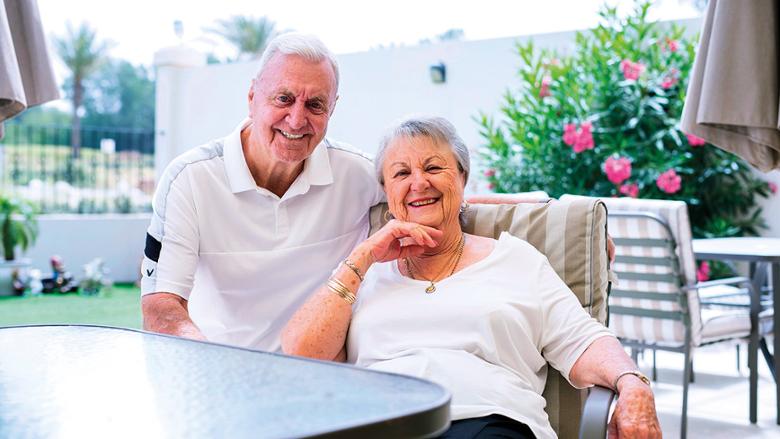
As a lad of 20, David arrived at the Headquarters in Sharjah of the Trucial Oman Scouts (TOS), financed by Britain, before being posted to a rifle squadron based at Fort Jahili in Al Ain. The Scouts had been formed back in 1951 to maintain security in the region and to prevent tribal and border disputes. He was one of the youngest officers to serve in the TOS.
‘I grew up in the naval town of Portsmouth in England,’ says David. ‘My father was in the navy but I contemplated a career in journalism.’ However, at the age of 18, he was called up for National Service. ‘I enjoyed the military life and decided to become a regular soldier,’ he says.
Initially, he was considered far too young for the TOS, but as luck would have it, he was selected to join the Force. Arriving at the Royal Air Force Airport in Sharjah (the only airport in the country at the time) he quickly realised this was going to be quite an adventure. ‘The heat was like nothing I’d experienced before. [In Portsmouth, like most places in England, it rains a lot]. There were no roads or electricity and I remember wondering what have I come to.’
While all the other British officers had attended a language course in Arabic, David, for some reason, missed that. ‘So I didn’t even know the basics of the language. People used to say Assalamu Aliekum and Kaif Haleq and I had no idea what they were saying.’ The young officer quickly realised that the first thing he had to do was learn Arabic ‘as hardly anyone spoke English’.
During his time at the fort in Jahili, he says he was privileged to meet and interact with Shaikh Zayed Bin Sultan Al Nahyan, who would become the President of the UAE, but at the time was the Ruler’s Representative in Al Ain and the brother of Shaikh Shakhbut bin Sultan Al Nahyan, the then Ruler of Abu Dhabi.
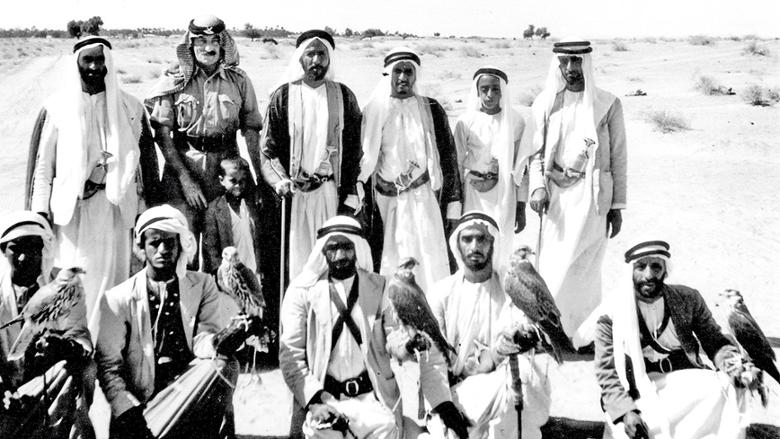
‘Occasionally in life, one is very fortunate to meet someone and immediately realise that one is in the presence of an exceptional person; this was certainly the case with Shaikh Zayed,’ David recollects fondly.
In those days life was more relaxed and it was possible to call on a Ruler or a dignitary relatively easily, and David has many happy memories of time spent with the great leaders. He remembers Shaikh Zayed as a person of average height and build and modestly dressed, yet his distinguished personality made him stand out instantly from others around him. ‘From the first time I was introduced to him I was aware not only of his presence and delightful personality, but also his natural charm, which made one feel relaxed and special in his company.
‘He also enjoyed massive respect and support from all the people of the area. He would sometimes drive into the fort in an open Land Rover and sit with us enjoying a traditional coffee and discussing any problems of mutual concern. He had an intensely inquisitive mind, and was keen to discuss local and world affairs and, in particular, the views of the Western world.’
David remembers how Shaikh Zayed would often discuss issues at great length and the conversation would inevitably turn to his love for the history of the region and his passion for his falcons. ‘He always travelled with an entourage that comprised loyal tribesmen, armed with a variety of weapons, and he would also have his magnificent falcons close by.’
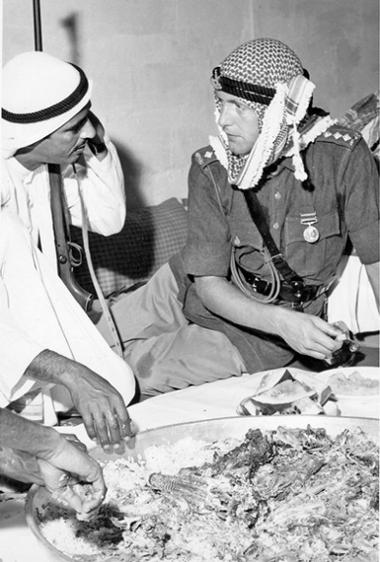
On several occasions David accompanied Shaikh Zayed on his hunting expeditions where they would spend long hours talking. ‘It was so obvious, even then, that here was a great man who loved the desert and everything associated with it, but was also more than capable of understanding the complex problems of the modern world. The time would soon arrive when it would be his destiny to transform his beloved desert into what the UAE has become today.’
After completing his 18-month tour of duty, David joined the Kings Regiment (Manchester and Liverpool) and saw service in Kenya, Berlin and Northern Ireland. However in 1966, a return to TOS was offered to command the support group based in Manama, where he spent a lot of time with Shaikh Rashid Bin Humaid, the Ruler of Ajman. The call of Arabia had proved too strong and David started his second tour with a much better command of the Arabic language.
On the night of August 5, 1966, he received a radio message from Sharjah HQ to be at the Mafraq (on the outskirts of Abu Dhabi) by dawn the following morning. On arrival he was briefed that Shaikh Shakhbut was stepping down to be replaced by Shaikh Zayed. ‘It was a great privilege for me to be present on this historic occasion. Only two of us British officers are still alive who witnessed this occasion.’
In 1968, the British Government announced its intention to withdraw its military presence in the region by the end of 1971. In the same year David, at the age of 28, had been promoted to major and was asked to command a rifle squadron at Fort Jahili in Al Ain. This gave him the opportunity to get to know UAE President His Highness Shaikh Khalifa Bin Zayed Al Nahyan, who had taken over from his father as the Ruler’s Representative in Al Ain. ‘Shaikh Khalifa took a keen interest in our squadron and its activities in Al Ain and he met me on a regular basis to discuss matters of mutual interest. At one such meeting, he requested that my squadron should march through the town in a farewell parade. This was a great compliment as, to the best of my knowledge, it was the first time any resident squadron in Al Ain had been given this honour. We duly marched through the town, with our splendid Regimental Pipes and Drums Band leading the way. The whole town seemed to turn out to cheer us on enthusiastically and His Highness acknowledged our salute as we marched past him. To hear bagpipes being played in the middle of the desert was also quite special, and to this day bagpipes can still be heard in military and police bands in the Gulf. The parade was followed by a magnificent banquet of camel and goat meat generously provided by Shaikh Khalifa, and vast quantities were consumed by all of us,’ says David.
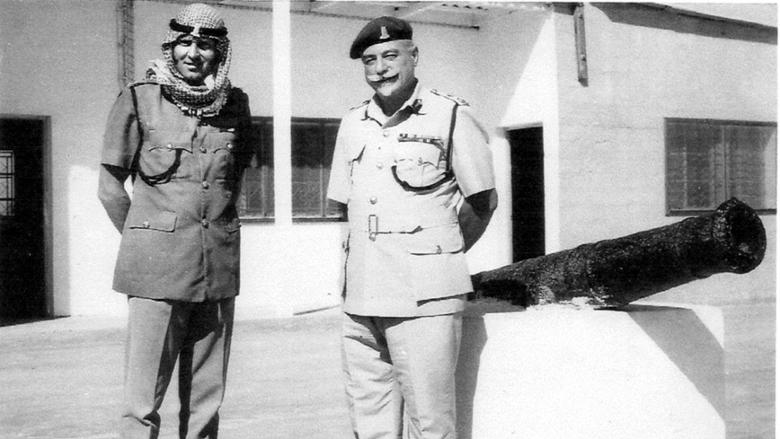
During the formation of the UAE, ‘Shaikh Zayed was instrumental in unifying the seven states as he realised the importance of the unity and believed that the wealth of Abu Dhabi should be used to the benefit of all’.
On leaving Fort Jahili, his squadron was chosen to be the first one ever to be based at a new location at Hum Hum in Ras Al Khaimah. David was invited to form a Mobile Force in RAK. ‘I was 31 and still a bachelor. I decided to quit the British army and take up this challenge and I still count this among my proudest achievements,’ he says.
After commanding the Ras Al Khaimah Mobile Force for three years, David left the UAE but returned a few years later only to leave for a mission in Africa in 1973, where he met his wife Eileen. They frequently visited the UAE and were always amazed at the rapid changes they witnessed each time.
In 2002, a TOS reunion was arranged by the UAE Ministry of Defence. His Highness Shaikh Khalifa, who was the Crown Prince of Abu Dhabi at the time, addressed newly commissioned officers at their passing out parade in Al Ain.
‘He singled out three reasons for the smooth transition from the seven independent states into the harmony that is enjoyed in the UAE today. The first was the will of Almighty Allah, the second the wisdom and vision of his father and the third, he said (pointing in our direction) was “those old gentlemen sitting over there”. There was a huge roar of agreement from all present,’ David recalls.
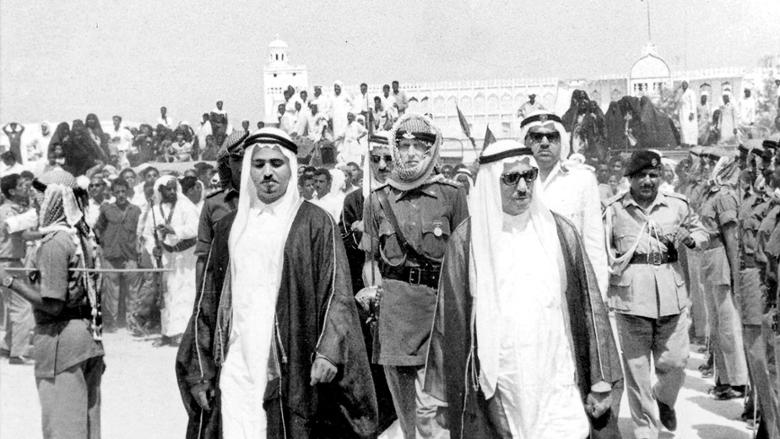
During a visit in 2012, His Highness Shaikh Saud Bin Saqr Al Qasimi, the Ruler of Ras Al Khaimah with whom he had maintained excellent relations, suggested that David write a book. ‘If the Ruler tells you to do something, a soldier always obeys,’ says the officer. In 2016 he published a memoir called A Soldier in Arabia. It reveals the behind-the-scenes story of the events that led up to the creation of the United Arab Emirates in December 1971.
A Soldier in Arabia has been well received and was also recently translated into Arabic by the National Archives.
Since 2013, David and Eileen have settled in Ras Al Khaimah, enjoying their retired life. He still enjoys a game of golf at Al Hamra Golf Club despite an ever-increasing handicap. Their daughter Michelle and family are also living and working here, which is a huge bonus for them. ‘It is a very calm and friendly town and we are blessed to be living here,’ says Eileen. ‘It’s like being on a holiday all the time.’
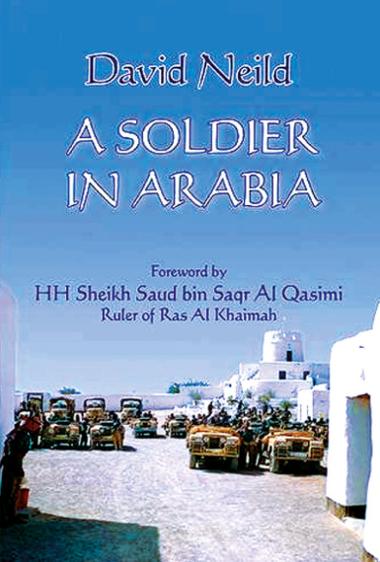
Last year David became the oldest man to experience the adrenaline-fuelled adventure at the Toro Verde zipline at Jebel Jais, Ras Al Khaimah (the record has since been broken). Gliding through the air at a speed of close to 120 kilometres per hour, he looked down at the mountains and a flood of emotions rushed through him remembering the role he had played in integrating the emirate into the UAE.
‘Back in my early days,’ he recalls ‘there were only a handful of expats in Ras Al Khaimah. Now it is home to a large expat community who appreciate the unique charm of this emirate. Tourism also attracts huge numbers every year who come to enjoy the unspoilt beaches and mountains. Great developments continue to flourish at a rapid rate and I want to be around for a long time to marvel at these projects in the emirate I am proud to call my home.’